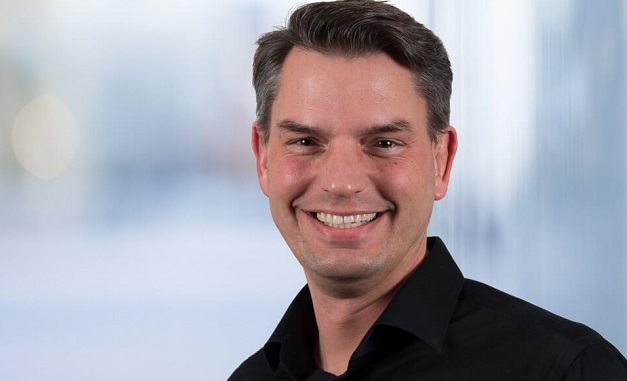“We should very much focus on this - Fear not, trust in God”
“Bringing people together, focusing on relationships. That could change the economy very much”, says the head of the Business Coalition of the WEA, Timo Plutschinski.
HAMBURG · 11 MAY 2020 · 10:45 CET

The economic consequences of the Covid-19 pandemic are already very tangible. Loss of jobs, instability of the stock market and governmental discussions about how each country should face its debt problems - these are all evidences of a serious situation that many had seen coming.
But what attitudes does this moment demand? Is it just an economic question?
“I would say the churches do have much responsibility for the mindset and for bringing people together in the terms of not fearing”, says the Director of the World Evangelical Alliance’s (WEA) Business Coalition, Timo Plutschinski, in an interview with Evangelical Focus.
The recent demand from African leaders to cancel the payment of the debt during the pandemic is just one example of how the world is reacting to the crisis, not only in terms of economy but also in terms of relationships.

Timo Plutschinski, Director of the Business Coalition of the WEA. Question. The Covid-19 has already generated an economic crisis which could last for a long time. Towards what possible scenarios are we walking? Will we return to 2008?
Answer. In some ways, we are returning to 2008 in terms of the insecurity of markets. This is the worst scenario for the investors and the financial markets because many company owners and business leaders don’t know what to do because they don’t know what’s coming next. So they can’t make plans, and investors don’t know what is worth an investment.
Many are hesitating to invest in the market, something that would be much needed now. Especially in times when consumption is also decreasing because of lockdown, people not being able to go to the restaurants or shop at all.
The difference with 2008 is that the issue now is more the real economy rather than the financial economy. 2008 was a financial bank crisis, while this is a crisis very much for the small and medium size companies. These companies already had problems in 2008 when they didn’t get credits and loan by the banks, but now the real economy is infected. Large companies often have governmental grants and support programs while the small and mediums size companies are struggling very much. The current situation is comparable to 2008 in that it has shaken –again- all of the economy.
Q. The International Monetary Fund (IMF) says that the global economy this year will fall around 3% and unemployment will grow in at least 10% in the Eurozone. How should we react to all this information?
A. The forecast is right. It is right that this situation will create a lot of unemployment and unfortunately in countries where they had already a difficult economic situation. But I wouldn’t focus too much on the single numbers. It’s not the numbers what matters, but the direction.
I would assume that Spain is also part of that, like Italy and other Southern European countries. So we have already a difficult situation and now, with the coronavirus pandemic, we’ll have that more. It’s like a chain. If companies are under pressure and don’t know what’s next and what is the forecast for the economic outlook, and don’t get loans from the banks or investors are hesitating, then, at the end of that chain, the single worker is affected. And companies will be hesitant to hire more people because they don’t know what is coming.
As for how can we manage all of this numbers and information, I would say, from a Christian point of view, fear should not be the prevailing message in these days because if you take all this messages, every day, you can really get afraid of all the developments. And fear could be an issue that destroys healthy relations. Both people and markets can get nervous, so fear would lead to bad consequences.
From a Christian point of view, we could very much focus on this claim: “Fear not, trust in God”. We should have a look on former pandemics or times of crisis to see how Christians do during other crisis, we can learn of them. There have always been economic turmoil, so this is not a new thing. What is new in a sense is that this is a global phenomenon in which every country of the world is involved, all of them facing the situation with different strategies.
Q. Before the epidemic there was a forecast of a contraction in the global economy. Has the epidemic sharpened this?
A. Yes, very much. The concentration of the global economy was also a consequence of the large companies who had more market shares.
Now, with this pandemic situation, the IT companies have won. For them it’s a brilliant time. They were big before and now, Amazon and others, are even bigger.
There is now more concentration on companies who were strong enough to master this crisis very well and there will be ‘winners’ of this coronavirus time. Whenever you have a company dealing with IT or healthcare companies, you are on the ‘winner’ side. On the other side are hundreds of thousands of production and services companies, which are very much under pressure. That is the problem for a post-corona time - how to revitalise the average, the majority of companies.
Q. So there will be more inequality.
A. Absolutely right. Not only among different social sectors but also between countries who are able to offer governmental grants and others who cannot do that. Especially in the Global South, countries are suffering because the difference is that they don’t have a government who can put millions or billions into the market. In Germany, for example, we do have microloans - each company owner also from the very small companies can get nine thousand or a fifteen thousand Euro cash. Not just loan but cash directly to support the grant. And beyond that, companies can get cheap loans from the governmental bank. It’s a great opportunity to have a business in Germany because there are some funds or support programs in the states (Länder) which put millions into the market to help the small companies. But that those not happen in many other countries. So there is a matter of injustice.
How to overcome these issues during this pandemic time? That’s the question. Probably with funds from the IMF and the World Bank, but they do give loans and not grants, so it will generate dependence. The weaker countries will be more dependent on international organisations, like these two.
Q. Which mechanism do we have as a society to palliate the effects of this crisis? What do we need?
A. Many smaller companies are suffering much, and it has to do with the consumption by the private households and private people. The more people are convinced the money is not gone, the more we could do to revitalise the market – being active, investing. That would be the approach that would help most.
Also the banks and governments do not have to keep money back and wait for better times but to be proactive and stimulate the market. That is the needed call for today.
Q. The last World Economic Forum (WEF) in Davos was focused on the stakeholder economy and the rethinking of capitalism. How do we have to rethink the economic system?
A. Capitalism is based on the responsibility of each own. But it is very much un-relational and I would very much emphasise on the relational economy. How can we strengthen the relationship between the various stakeholders and the shareholders? Probably, the issue is how to connect suppliers, how to give the clients a stronger position in the market. For example, the microloan market put different people together and they get a loan which gives stability to all groups of people in the market. So these could have a better and stronger position.
But we are very much influenced by the paradigm of individualism. Capitalism is the expression of the individualistic approach to the market. If we can change this, we don’t need a Communist system or a much stronger governmental involvement - the government is not the best company. But bringing people together, focusing on relationships... that could change the economy very much.
Q. As Christians, we are not alien to this crisis. What advice can follow the churches to face this challenge to their own economy?
A. The church is currently quite silent on this. I mean, they are not much involved in the market, especially the evangelical churches. The Catholic Church has much more financial power with the Vatican Bank, so they can do efforts to stimulate the market and I would very much encourage the Christian funders and investors to take responsibility on that, and to intentionally invest right now rather than keep the money back.
But the churches, the congregations, I would say they have a responsibility about the mindset and for bringing people together and be close to the people in the terms I mentioned before: not fearing. Churches should proclaim this message very much, probably rather more than to be an economic factor - small communities have small budgets. It’s more what they can do in regards to people’s faith and mindset. Organisations and people who push this message are needed now.
Q. How are Christians called to be a testimony and do the mission in a context of economic crisis?
A. For example, as a family, my wife and I with the kids talked about how to support the local restaurants and we decided to, every Sunday, order a meal at a certain restaurant. So we give a phone call to the restaurants and order some food. That was an opportunity to spend more money to local providers. Then we also encouraged other church members to do the same. It was kind of a dynamic. There is a thing every Christian can do to support the local economy.
Secondly, we should use opportunities to speak to neighbours and people we meet. Lockdown means people are more or less at home so we can recognise a lot of neighbours that we never saw before because they also have jobs and are not just sitting in the garden. It’s important to build relationships because these relationships will last, in a post-coronavirus time as well. We can prepare ourselves and our communities for a post-coronavirus time.
Finally we also have to focus on the Christian testimony and the evangelisation. Due to coronavirus we can’t make big events but what we can do is to live the claim that every believer is a witness in our own sphere of influence. That is an opportunity I would like to encourage Christians to make use of. It is not that much an economical advice but spiritual. Maybe through this conversation we also can encourage people and help and support them in regard to their fear. That is needed very much.
Published in: Evangelical Focus - world - “We should very much focus on this - Fear not, trust in God”
